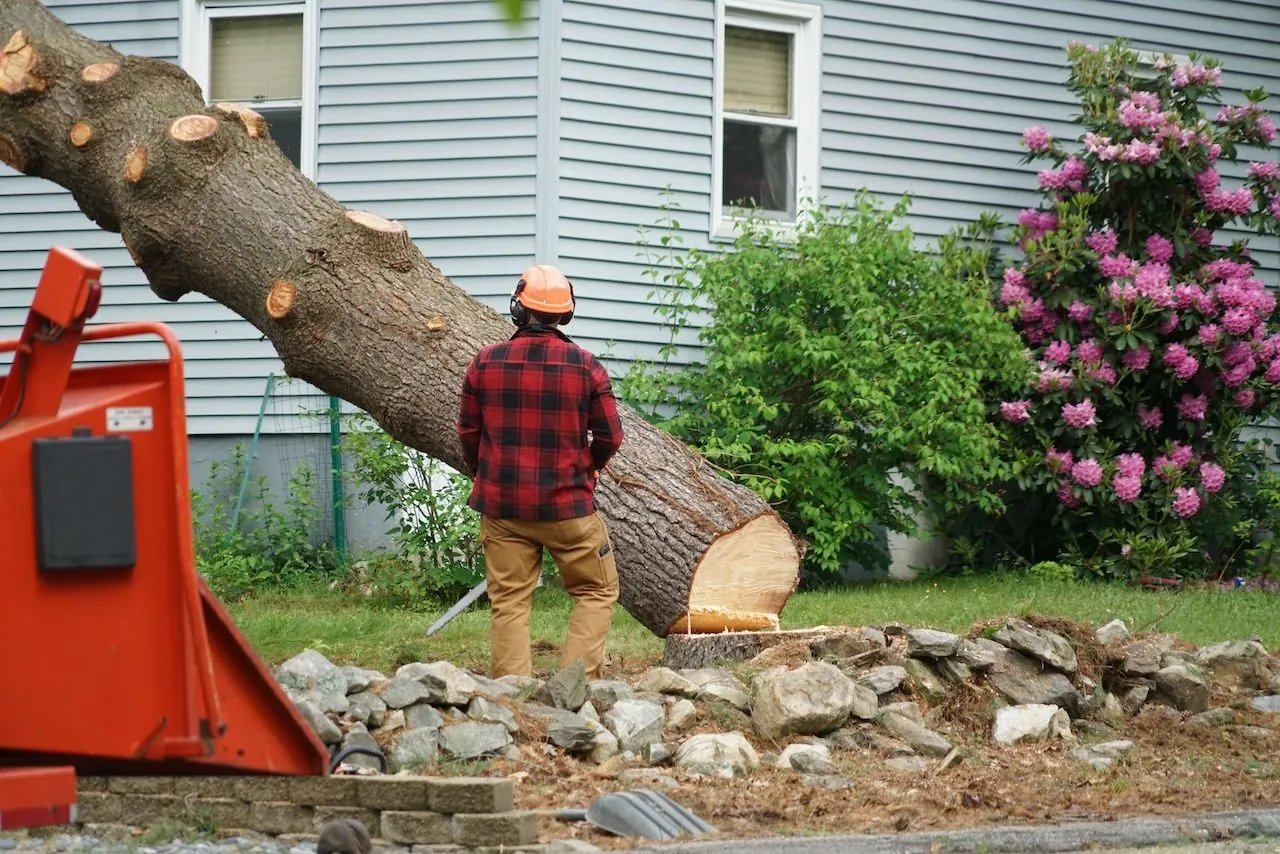Imagine the following scenario: a loud rumble reverberates through your room, and you realize a tree has collapsed onto your house. For homeowners, such unforeseen occurrences can be profoundly unsettling, but knowing how to respond is crucial. The top priority is to ensure the safety and security of everyone involved, followed by mitigating the damage and navigating through the aftermath, which includes dealing with insurance claims and restoring your property to its prior state. This handy guide outlines the steps to take if a tree falls on your house.
The Immediate Steps You Should Take When A Tree Falls On Your House
- Evacuate Safely. Leave the house carefully to avoid potential harm from aftershocks or structural instabilities caused by the fallen tree and structural damage. Make sure to check for any gas leaks or electrical hazards before leaving.
- Contact Emergency Services. If there are any power lines involved or any hint of a fire risk, call 911 immediately. Emergency services will assist in assessing the situation and provide support for a tree falling on your home.
- Alert Your Insurance Company. As soon as you’re in a safe location, report the incident to your insurance company to start the insurance claim process.
- Document the Damage. Take photographs or video evidence of the damage from various angles, ensuring you have a thorough record for the insurance assessment. Avoid touching or moving anything until the insurance adjuster has seen the damage.
- Secure the Property. Arrange for a professional service to remove the tree safely and secure your property to prevent further damage or unauthorized entry. If necessary, board up any broken windows or doors.
- Find a Place to Stay. If your house is uninhabitable, arrange to stay with family or friends or contact your insurance company for temporary housing options.

It’s important to prioritize safety above all else in such circumstances. If there is any uncertainty, get professional assistance and refrain from attempting to address the situation alone.
Mitigating the Tree Damage
With emergency services on the scene and your family safe, your focus may turn to mitigating property damage. If weather conditions allow, promptly cover any structural breaches with tarps to prevent water infiltration. However, avoid doing anything that puts your safety at risk. Remember, your life is far more important than your home.
Tree Removal and Damage Restoration
Hiring professional services for tree removal and initiating the restoration process is highly recommended. Specialists, like a property restoration company, can provide a thorough assessment and take charge of the recovery process. Skilled professionals will remove the tree and scattered debris while safeguarding the property from further damage. Additionally, they assist in navigating insurance claims and provide accurate estimates for repair costs and removal costs.

Navigating Insurance and Legalities
Determining financial liability in the aftermath of such an event is complex, often depending on specific circumstances and local regulations. Generally, your homeowners’ insurance policy covers damages from a tree falling on your property. However, liability considerations may arise if the tree is identified as dead or diseased and proper maintenance is overlooked. Seeking guidance from legal professionals can offer clarity in navigating these complex matters.
For instance, if a neighbor’s dead tree falls on your property, they might be liable if they willfully ignore the risk. Conversely, if your tree falls on a neighbor’s house due to natural causes and without proven negligence, your neighbor’s insurance should address the damage.

The Emotional Toll of the Experience
Going through such a traumatic event is not solely a financial and logistical challenge—it’s also an emotionally taxing experience. Allow yourself time to process what has occurred and rely on support from friends, family, or professionals to help you recover when a tree falls on your house.
Frequently Asked Questions (FAQs)
Q: Can I sue my neighbor if his dead tree falls on my house?
The specifics differ by state, but if you prove that the neighbor was aware and failed to act, they could be liable for damages.
Q: If my tree falls on a neighbor’s house, who is responsible?
If negligence is absent and the tree is healthy, your neighbor’s insurance company usually bears the cost. Conversely, your neglect could make you liable.
Q: Can a house withstand a tree falling on it?
While houses are robust, a tree fall can inflict significant tree damage depending on the tree’s size and what part of the house it impacts. It’s best to evacuate and get professional help instead of endangering yourself by assessing the damage firsthand.
Q: Who is responsible if a tree falls?
Typically, the property owner of where the tree lands should foot the bill, alongside their insurance provider, unless negligence by another party caused the fall.
Q: Are fallen trees covered by homeowners’ insurance?
Mostly, yes—assuming due care was taken to maintain the property and prevent the tree from falling.
Q: Which trees are most likely to fall?
Trees that are unhealthy or previously damaged. Additionally, trees near buildings or power lines are at higher risk due to external factors like strong winds and storms. It’s essential to inspect and maintain trees regularly.
Q: When should I be concerned about a tree falling?
Look for signs of disease or damage. Contact a tree removal company for tree removal services to address potential dangers preemptively. Also, if the tree leans toward your house, consider taking action to avoid future risks. Remember that a healthy-looking tree can also fall in extreme weather or for other reasons. Be proactive.
Having a tree fall on your property is undoubtedly daunting, but equipping yourself with the knowledge to handle the situation is empowering. Prioritize your safety above all else, and enlist professional assistance to facilitate a seamless recovery and restoration process. Remain vigilant, prepared, and proactive throughout.
Devastated by Property Damage? Call PuroClean!
If a tree has fallen on your property, contact PuroClean for professional assistance in restoring it to its pre-loss condition. Our team specializes in property damage restoration and will work quickly and efficiently to assess the damage and develop a comprehensive restoration plan. Don’t hesitate to get help from PuroClean to ensure a stress-free and safe recovery process. Use our office locator or give us a call at (888) 775-7876 today.


